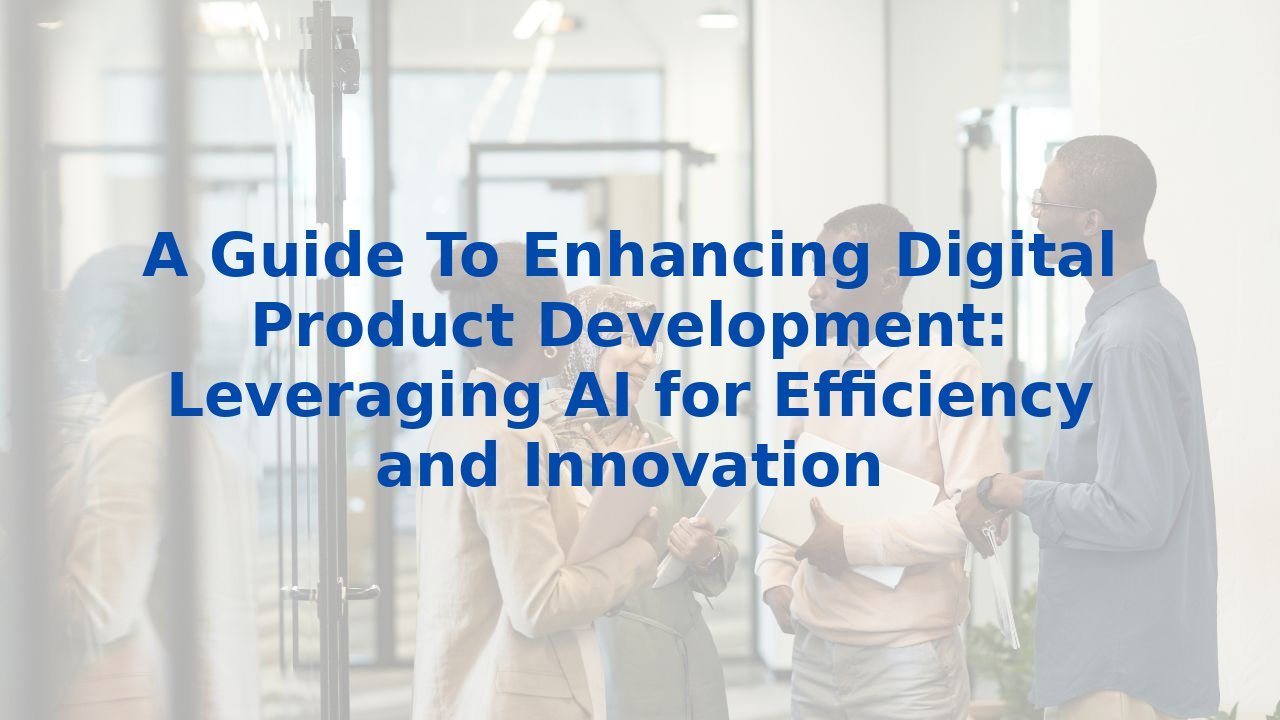A Guide To Enhancing Digital Product Development: Leveraging AI for Efficiency and Innovation
A Guide To Enhancing Digital Product Development: Leveraging AI for Efficiency and Innovation
In the fast-paced realm of digital product development, the introduction of Artificial Intelligence (AI) is nothing short of revolutionary. What once seemed like a futuristic concept is now a practical reality, redefining how companies create, test, and launch products. This guide explores the fundamental business processes involved in product development and discusses how organizations can leverage AI to enhance efficiency and foster innovation.
The Transformative Role of AI
AI's integration into digital product development spans across various stages, from ideation to validation. By harnessing its capabilities, businesses are not just keeping up with trends but actively reshaping their approach to the product lifecycle.
Key Areas of AI Influence
1. Research and Analytics
Understanding user behavior is pivotal in product development. AI makes this easier by analyzing massive datasets to predict user actions and identify market trends. By utilizing machine learning algorithms, teams can gain insights into user motivations, allowing for informed decision-making. This level of analysis not only broadens understanding but also drives product strategies that are more relevant to the intended audience.
2. Content Generation
Looking to amplify creativity? AI has taken the lead in both content creation and design automation. By automating repetitive tasks, it accelerates the iterative design process, encouraging new ideas to surface during brainstorming sessions. For creatives, AI tools have become invaluable assets, enabling them to push past blocks and think outside the box.
3. Prototyping and Testing
Incorporating AI into prototyping workflows streamlines processes, allowing designers to concentrate on higher-order challenges. With AI-driven testing tools, organizations can automate comprehensive testing procedures, resulting in faster results and heightened quality assurance. Predictive capabilities ensure that developers can catch defects early, leading to superior software delivery.
4. Personalization
Today’s consumers crave personalized experiences. AI excels in this domain, dynamically tailoring content to individual user preferences in real-time. Chatbots further enhance user engagement, collecting feedback that informs future product iterations and boosts customer satisfaction.
5. Accessibility
AI is pivotal in enhancing product accessibility through features like voice recognition and facial analytics. These advancements create inclusive environments where diverse user needs are met, ensuring that digital products resonate with a broader audience.
Benefits of AI-Enhanced Product Development
1. Efficiency and Time Savings
AI shines by automating menial tasks, significantly cutting down the time required for routine functions. This efficiency empowers teams to focus on the pivotal creative and strategic elements of their projects.
2. Iterative Design and Customer Satisfaction
With AI supporting an iterative design approach, products evolve based on real user feedback, enhancing relevance and resonance with the target market. This continuity leads to refined, engaging products that stand out in competitive spaces.
3. Creativity and Innovation
Generative AI is a catalyst for innovation, inspiring fresh ideas and encouraging designers to explore uncharted solutions. Breaking free from conventional thought patterns can lead to breakthroughs that drive success.
4. Improved Quality and Reduced Risks
AI's ability to identify flaws early in the development process ensures that high-quality standards are consistently met. Its comprehensive testing capabilities guarantee that products undergo rigorous validation to minimize risks associated with market launches.
5. Faster Time-to-Market
In a world where speed dictates competitive advantage, AI accelerates product launches. By automating crucial stages of development, organizations can bring their innovations to market quicker, seizing opportunities ahead of rivals.
The Necessity of Employee Training in AI
As AI becomes integral to product development, training employees to navigate this technology is essential. Knowledge of AI capabilities and limitations will empower teams to harness its full potential.
1. Mastering AI Tools
Understanding how to integrate AI into existing processes is critical. Training programs tailored to develop competencies in data analysis, programming, and machine learning will enhance workplace synergy.
2. Ethical Responsibility
With great power comes great responsibility. Employees must be educated on the ethical implications surrounding AI, ensuring that these technologies are employed judiciously.
3. Embracing Continuous Learning
AI technology is evolving at breakneck speed. A culture of continuous learning within organizations will keep employees updated on the latest advancements, ensuring they remain adept in a changing landscape.
Conclusion
AI is not merely a tool; it is a transformative powerhouse reshaping the landscape of digital product development. By integrating AI strategically throughout the product lifecycle, organizations can enhance efficiency, drive innovation, and significantly improve collaboration. Ultimately, as companies embrace the potential of AI, they position themselves at the forefront of their industries, ready to lead in an ever-evolving marketplace. To learn more about empowering your team with AI skills, explore options for tailored training solutions for your workforce.



